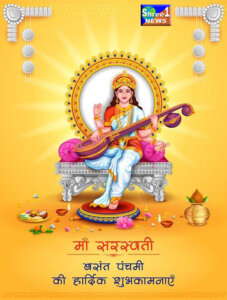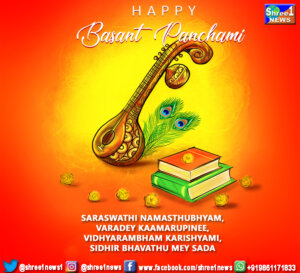Vasant Panchami, sometimes referred to as Saraswati Puja or Basant Panchami, is an auspicious Hindu festival that is observed throughout Nepal and India. Falling on the fifth day (Panchami) of the bright half (Shukla Paksha) of the Hindu calendar month of Magha, often in late January or early February, Vasant Panchami commemorates the arrival of the spring season. This holiday is important from a cultural, religious, and social standpoint. It unites people to celebrate the arrival of spring and ask for favors in the areas of knowledge and creativity. We shall discover more about Vasant Panchami in this blog, including its significance, the reasons behind its celebration, how it is observed, and much more.
Meaning of the word “Vasant Panchami”
The Sanskrit terms “Vasant,” which means spring, and “Panchami,” which denotes the fifth day of the lunar fortnight, are combined to form the name “Vasant Panchami.” Basant Panchami signifies a new beginning and a fresh start as winter ends and flowers flourish. All throughout India, but particularly in states like West Bengal, Bihar, Uttar Pradesh, and Rajasthan, people celebrate it with great fervor.

What is Vasant Panchami?
What does Vasant Panchami mean? Hindus celebrate Vasant Panchami, a significant festival. Devotees honor and revere Goddess Saraswati, the goddess of learning, arts, wisdom, and knowledge, during this festival. Vasant Panchami, which represents the rebirth of nature and the start of new beginnings, has enormous cultural, religious, and social significance.
The question of why we celebrate Vasant Panchami is one that many people ask us. Though its name suggests happy springtime celebration, Vasant Panchami is much more than that. With an emphasis on wheat farming, the celebration marks the beginning of the Rabi crop harvesting season.
Farmers consider this event to be a lucky time to begin clearing their fields for planting. The countryside is enhanced by the sight of full-blown yellow mustard blossoms, which represent wealth and plenty.
Vasant Panchami so serves as a reminder of the intimate relationship that exists between human existence and the natural world as communities celebrate the abundance that the planet provides. The festival’s agricultural theme emphasizes how important it is to respect and honour the land that sustains us, fostering a sense of gratitude and love towards the environment. As people gather to celebrate Vasant Panchami, they also express appreciation for the agricultural heritage of their ancestors and the vital role farming plays in sustaining communities. Now that you have learnt about the Vasant Panchami background let’s get into when it is celebrated, why it is celebrated and how people celebrate it.

Vasant Panchami Date
In the calendar commonly used worldwide, the date of Vasant Panchami shifts annually due to the differences between the lunar and solar calendars. It is a time for communities to come together, offer prayers, and seek blessings for academic pursuits, creativity, and spiritual growth. The exact date of Vasant Panchami can be determined by consulting Hindu calendars or astrological calculations, ensuring that devotees can prepare and partake in the festivities with enthusiasm and reverence.
During this time, families come together to tidy up and adorn their homes, fostering a joyous and eagerly awaited festive ambience. Traditional rituals are performed with devotion, including the offering of flowers, fruits, and sweets to Goddess Saraswati’s idol or picture. The Vasant Panchami date reminds us of the importance of education and the pursuit of knowledge, encouraging individuals to embrace learning and intellectual growth. It is a time for reflection, gratitude, and celebration as communities unite to welcome the arrival of spring and the blessings of Goddess Saraswati. As of 2024, Vasant Panchami is on the 14th of February.
Why is Vasant Panchami/ Saraswati Puja celebrated?
Vasant Panchami means to honour Goddess Saraswati, the deity of knowledge, wisdom, arts, and learning. The festival holds cultural, religious, and social significance as it symbolises the rejuvenation of nature and the beginning of new beginnings. Devotees adorn themselves and their surroundings in vibrant yellow colours, representing prosperity and vitality, while schools and colleges organise special events to encourage the pursuit of knowledge and creativity.

Vasant Panchami – Importance
Saraswati Puja, another name for Vasant Panchami, is a very important Hindu festival. Vasant Panchami is significant in many facets of life, including agricultural, religious, and cultural components. In terms of culture, it is a time when people gather together to celebrate prosperity and life.
Worshiping Goddess Saraswati—the personification of wisdom, knowledge, and the arts—has religious importance. Her blessings are sought by devotees for success in school, creativity, and spiritual development. This joyous occasion serves as a reminder of life’s cyclical nature, in which the approach of spring ushers in fresh starts, development, and plenty. All things considered, the significance of Vasant Panchami emphasizes the joy of spring, the devotion to Goddess Saraswati, and the agricultural success it portends.
The significance of Vasant Panchami not only honors Goddess Saraswati but also demonstrates the heavenly love between Lord Krishna and Radha. Hindu legend states that on this day, Lord Krishna worshipped Goddess Saraswati in order to gain enlightenment and knowledge. In addition, mustard flowers bloom throughout the celebration, adding to the event’s yellow splendor and representing fertility and prosperity.
Vasant Panchami is a religious holiday, but it’s also widely observed culturally and with parties. Families and friends should gather together during this time to celebrate, exchange pleasantries, and enjoy the festive atmosphere.
Examining the meaning and practices of Vasant Panchami in greater detail reveals a realm of customs, beliefs, and celebrations that encapsulate the spirit of spring and the pursuit of knowledge. Join us on this journey as we explore the colours, rituals, and joyous celebrations that define this auspicious occasion.
Vasant Panchami is celebrated in which state?
Vasant Panchami importance spreads across our country. It is celebrated in several states across India, including West Bengal, Bihar, Uttar Pradesh, and Rajasthan. The Vasant Panchami celebration in these states is done with great enthusiasm, organising various events and ceremonies to honour Goddess Saraswati and welcome the spring season.
In West Bengal, Vasant Panchami is celebrated as Saraswati Puja, with elaborate rituals performed in schools, colleges, and homes to seek blessings for academic success. Similarly, in Bihar, Uttar Pradesh, and Rajasthan, the festival is marked by vibrant celebrations, cultural performances, and communal gatherings, highlighting the significance of Vasant Panchami in these states.
Vasant Panchami Wishes
Vasant Panchami wishes are heartfelt messages exchanged during the festive celebrations of this auspicious occasion. As people come together to honour Goddess Saraswati and welcome the arrival of spring, they express their warmest regards and blessings through Vasant Panchami wishes.
These wishes convey heartfelt prayers for wisdom, knowledge, and success in academic pursuits. Here are some common Vasant Panchami wishes:
“Wishing you a joyous Vasant Panchami filled with blessings of Goddess Saraswati.”
“May this Vasant Panchami bring prosperity and happiness to you and your family.”
Vasant Panchami Shlok
A Vasant Panchami Shlok is a traditional verse or hymn recited during the auspicious occasion of Vasant Panchami. These shlokas are typically dedicated to Goddess Saraswati, the deity of knowledge, wisdom, arts, and learning, whom devotees honour during this festival.
“या कुन्देन्दुतुषारहारधवला या शुभ्रवस्त्रावृता
या वीणावरदण्डमण्डितकरा या श्वेतपद्मासना।
या ब्रह्माच्युतशंकरप्रभृतिभिर्देवैः सदा वन्दिता
सा मां पातु सरस्वती भगवती निःशेषजाड्यापहा॥“
The shlokas often praise the virtues of Goddess Saraswati and seek her blessings for academic success, creativity, and spiritual growth. Shlok for Vasant Panchami is recited with admiration and devotion by students, teachers, and devotees in educational institutions, homes, and temples.
Vasant Panchami shlok is an integral part of the festival’s rituals, symbolising the importance of seeking divine blessings for enlightenment and the pursuit of knowledge. These revered verses awaken feelings of spirituality and respect, establishing a solemn atmosphere for the festive gatherings where communities unite to pay homage to Goddess Saraswati and embrace the onset of spring.
Source:kto








 Finance
Finance






